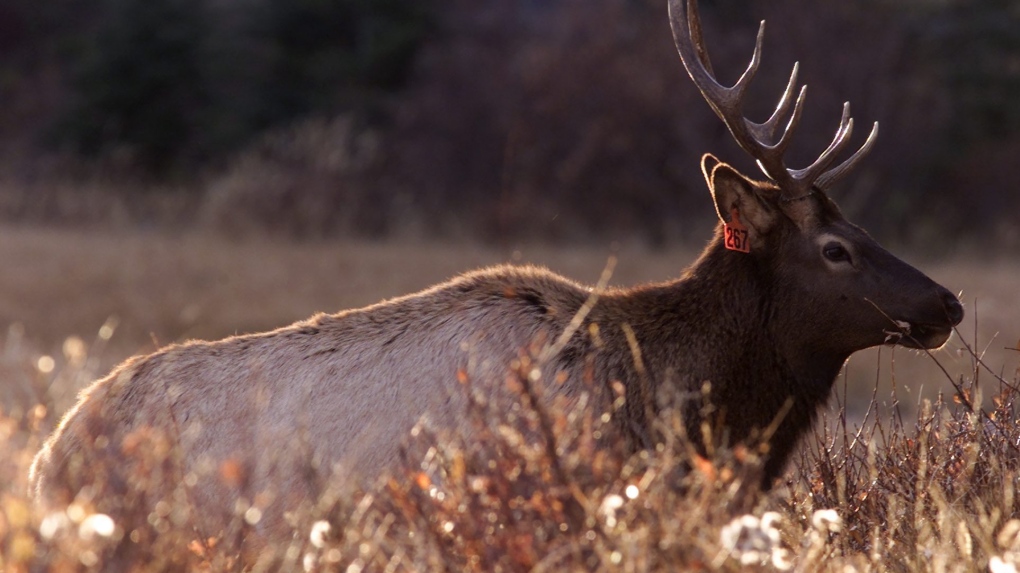Parks Canada disputes wildlife attack information reported by SportingPedia
 A male Elk wanders through the grass along the Vermillion Lakes near Banff, Alberta Wednesday November 1, 2000. (CP PHOTO/Adrian Wyld)
A male Elk wanders through the grass along the Vermillion Lakes near Banff, Alberta Wednesday November 1, 2000. (CP PHOTO/Adrian Wyld)
Parks Canada says information on wildlife attacks in Canada published by a sports news and betting website isn't accurate, saying the outlet "misinterpreted" the data used and presented "exaggerated and false conclusions."
The article from SportingPedia.com examined data on human-wildlife interactions in select national parks from 2010 through 2021, using information from Parks Canada's Open Government portal.
Published on Feb. 15, the article suggested Alberta is the most common place to have a wildlife encounter, and elk are the most dangerous.
"Data reveals that elk are the most likely to attack, followed by grizzly and black bears, depending on the province or territory you live in," reads the article.
SportingPedia said its research showed there were 3,726 wildlife attacks in Alberta during the 12-year period, with the majority of those (2,299) attributed to elk.
Grizzly bear attacks (431) and black bear attacks (243) were listed second and third, while other animals made up the remainder.
However, Parks Canada is calling SportingPedia's methodology into question, saying it does not support the conclusions presented in the article.
"The data that are accessible to the public include instances of many kinds of human-wildlife interactions," said Parks Canada in a statement sent to CTV News.
"The vast majority of incidents are minor and can be managed safely with low risk to people. Some of these incidents are classified as 'aggressive encounters,' which is a broad term that includes a wide range of animal behaviours, including contact with people, property and pets; a non-contact charge towards a person, pet or vehicle; or a physical or aggressive display (non-contact).
"An aggressive encounter is not the same as an attack. Occasionally, there are hazardous incidents between people and wildlife that can result in injury or death of either wildlife or people.
"The outlet misinterpreted Parks Canada’s data, and presented exaggerated and false conclusions."
Parks Canada said it is committed to increasing public awareness about respecting wildlife and safe practices for coexistence in shared landscapes, and identifying proactive measures to reduce conflicts and avert serious incidents between people and wildlife.
CTV News has reached out to SportingPedia for comment, and will update this article with the organization’s response when we hear back.
Correction
CTV News originally reported on the findings of SportingPedia’s article but has since updated our original copy with concerns outlined by Parks Canada.
CTVNews.ca Top Stories

opinion Tom Mulcair: Prime Minister Justin Trudeau's train wreck of a final act
In his latest column for CTVNews.ca, former NDP leader and political analyst Tom Mulcair puts a spotlight on the 'spectacular failure' of Prime Minister Justin Trudeau's final act on the political stage.
B.C. mayor gets calls from across Canada about 'crazy' plan to recruit doctors
A British Columbia community's "out-of-the-box" plan to ease its family doctor shortage by hiring physicians as city employees is sparking interest from across Canada, says Colwood Mayor Doug Kobayashi.
'There’s no support': Domestic abuse survivor shares difficulties leaving her relationship
An Edmonton woman who tried to flee an abusive relationship ended up back where she started in part due to a lack of shelter space.
opinion King Charles' Christmas: Who's in and who's out this year?
Christmas 2024 is set to be a Christmas like no other for the Royal Family, says royal commentator Afua Hagan. King Charles III has initiated the most important and significant transformation of royal Christmas celebrations in decades.
Baseball Hall of Famer Rickey Henderson dead at 65, reports say
Rickey Henderson, a Baseball Hall of Famer and Major League Baseball’s all-time stolen bases leader, is dead at 65, according to multiple reports.
Arizona third-grader saves choking friend
An Arizona third-grader is being recognized by his local fire department after saving a friend from choking.
Germans mourn the 5 killed and 200 injured in the apparent attack on a Christmas market
Germans on Saturday mourned the victims of an apparent attack in which authorities say a doctor drove into a busy outdoor Christmas market, killing five people, injuring 200 others and shaking the public’s sense of security at what would otherwise be a time of joy.
Blake Lively accuses 'It Ends With Us' director Justin Baldoni of harassment and smear campaign
Blake Lively has accused her 'It Ends With Us' director and co-star Justin Baldoni of sexual harassment on the set of the movie and a subsequent effort to “destroy' her reputation in a legal complaint.
Oysters distributed in B.C., Alberta, Ontario recalled for norovirus contamination
The Canadian Food Inspection Agency has issued a recall due to possible norovirus contamination of certain oysters distributed in British Columbia, Alberta and Ontario.

































